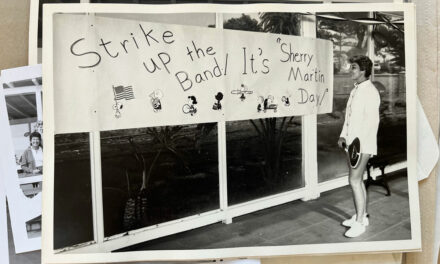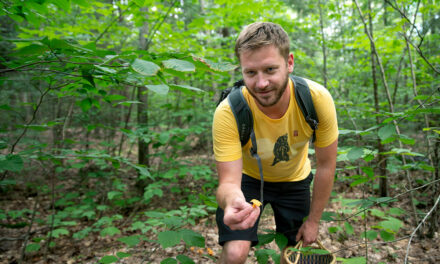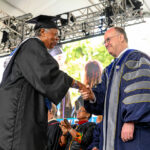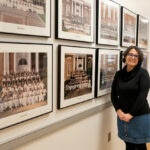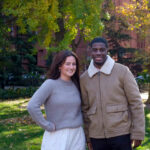
Voices of Leadership
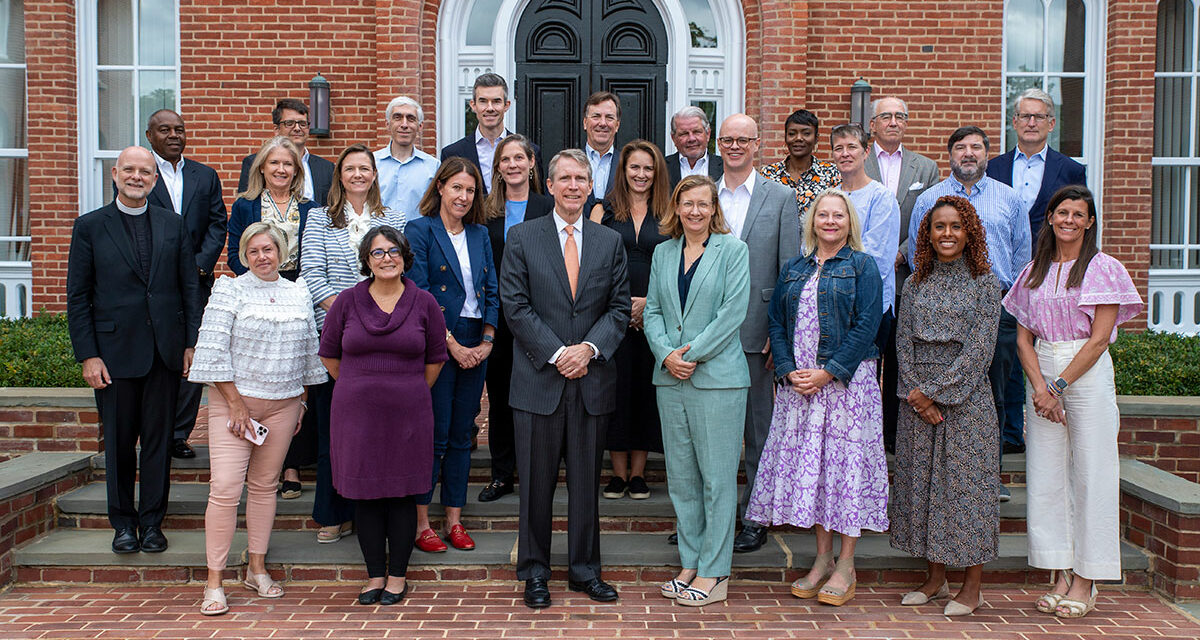
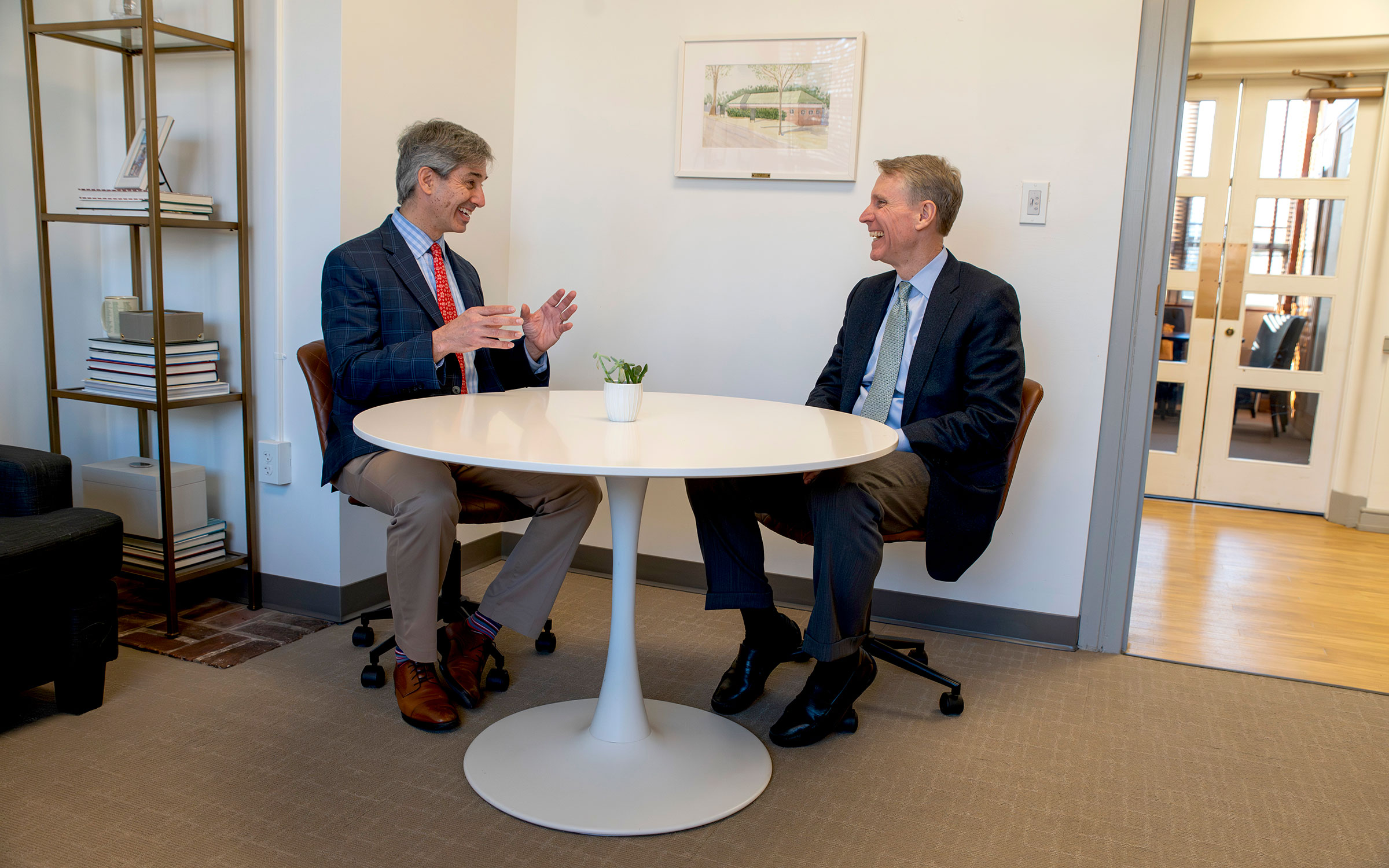
Voices of Leadership
Associate Head of School Bob Weiman sat down with Timothy D. Adams to discuss his new role as chair of the Board of Governors.
Tim Adams, the new chair of the Board of Governors, is in his sixth year of service on the Board. During that time, he served as chair of the Strategic Planning Committee for three years. Tim’s wife Jennifer has served the school for many years as president of the Association of Parents and Teachers, co-chair of the APT Gala, and co-chair of Steve & Aggies café. Tim has cheered on his children, Tindall ’18, William ’22, and Augusta ’24, in their many activities at the school.
Currently holding the position of president and CEO at the Institute of International Finance (IIF), Tim plays a pivotal role in shaping and implementing the organization’s programs, working closely with the Board of Directors to guide its strategic initiatives. Before his tenure at the IIF, Tim served as the managing director of The Lindsey Group, an economic advisory firm situated in Washington, D.C.
Tim’s extensive experience includes a notable term as Under Secretary for International Affairs at the U.S. Department of Treasury. In this influential role, Tim served as the administration’s key representative on international financial matters, overseeing crucial areas such as exchange rate policy, G-7 meetings, and issues related to the IMF and the World Bank. His responsibilities also involved engaging with counterparts in significant emerging markets like China, India, and Brazil, with extensive travels throughout Asia, the Middle East, and Europe. Preceding his position as Under Secretary, Tim held the role of chief of staff to both Treasury Secretary Paul O’Neill and Treasury Secretary John Snow. Tim is a two-time winner of the Alexander Hamilton Award, the highest award given at the U.S. Treasury Department.
In 1993 Tim co-founded the G-7 Group, a Washington-based advisory firm specializing in global financial services. From 1990 to 1992, he served as an economic policy analyst at The White House Office of Policy Development.
Tim has served on the vestry and the Foundation at St Paul’s Church in Old Town Alexandria, on the boards of The Atlantic Council and the Center for Global Development, and as a member of the Council on Foreign Relations. He holds a bachelor’s in finance, a master’s in public administration, and a master’s in international relations from the University of Kentucky.
BW: You have been on the Board of Governors for five years, and last summer you started as the Board chair. There are many ways to volunteer at SSSAS—why have you decided to volunteer and contribute through the Board?
TA: First of all, I’m a firm believer that we need to take part of our life and our resources and give back. I’ve been very fortunate in my life and it’s important for me to share that good fortune with others and to act as a role model for my children that they too should—whether it’s in a position of leadership, philanthropy, or as a volunteer—reach beyond themselves and contribute to the broader community. It’s pretty natural for not only me, but also my wife Jennifer, to be an active volunteer. She has had many volunteer leadership roles at the school through the APT, and now she’s on the front lines at Steve & Aggies, which may be a harder job than mine.
It was a real honor to be considered and to be asked to take this job. I must say, I did not see it coming. At first I thought maybe they got the wrong Tim or it was Tom that they were looking for. But it’s such a remarkable time. I know we’ll talk more about the field of education and the broad currents and trends that we’re living through, but I thought, what a great place where I feel like I can make a real tangible contribution on a daily basis with the next generation—the people who are going to be running things probably sooner than we think.
BW: You mentioned broad trends and you spoke about it to the faculty, too, at the beginning of the year. What do you see as the kind of broad educational trends that the Board is thinking about and that the school is thinking about?
TA: I grew up in the 1960s when you had enormous cultural, social, and technological disruption and change. I think this is one of those periods with technology, especially with the advent of AI. We’re quickly moving to generalized AI and quantum computing, which are moving from theory to practical application at a blinding pace. Robotics, synthetic biology, and all these things mixed together are making for a remarkable technological transformation, building on computerization and all the other aspects of change that we’ve been living through for the last 20 or 30 years. Add in dynamic social and cultural change, and all those make for a really interesting time. It is not sleepy. It is not boring. It is dynamic. Our children are living through this. They’re learning important skills and to understand the importance of embracing change, but also adhering to certain values, too.
BW: I’ve been a part of this community for 30 years and you’ve been here for many years as well. Schools go through different phases and changes throughout their history and reach different inflection points. Why do you feel that this time in the life of the school is an exciting one?
TA: First of all, I think there are many great strengths of this school. One is that we focus on the whole child, and I think that’s important. It’s not just the intellectual development of students, it is about learning key values and habits, such as persistence and motivation. I was just watching the field hockey game yesterday and was impressed with the grit, the
“I think there are many great strengths of this school. One is that we focus on the whole child, and I think that’s important. It’s not just the intellectual development of students, it is about learning key values and habits, such as persistence and motivation.”
pluck, that these kids have. Whatever they’re learning now, a lot of it will be obsolete in a very short period of time. The jobs they’ll have 20 or 30 or 40 years from now don’t exist. Those industries don’t exist. The firms don’t exist. We’re sending them out to this great unknown, and I think it’s these kinds of traits, these characteristics, this thinking about the whole person that is a hallmark of this school. One that is going to serve these kids throughout their lifetime in a world which we really can’t yet quite anticipate.
BW: Yes, and if you think about the different initiatives that the school has taken—let’s say since your time on the Board, or any time since you’ve been a part of the community, or at this point in time—what are the ones that you feel particularly passionate about?
TA: I think there are several. One is the focus on equity and inclusion and belonging. I think it’s important for our children to understand they are all God’s children. They were all created equal, we are all inhabitants of this great earth, and we need to treat each other with dignity and respect. And the more that we can emphasize that on a daily basis the better. I think they get it, and I think they sometimes exercise it more than adults. In terms of programs, I love the language and the study abroad and travel abroad programs. It’s a big world out there and it’s important to get your passport and go out and see it. It’s important to explore the United States as well. Miami is not New Orleans and it’s different from Maine and different from Seattle—get out there and see how humanity lives and that not everyone lives like we do.
It’s important to learn about history to understand cultural heritage, not only Western traditions, but Eastern traditions, too. They need to see the world and understand what a great, beautiful, wonderful, dynamic place it is and hopefully have a wanderlust for the rest of their lives to go out and see what’s over the horizon.
“I think it’s important for our children to understand they are all God’s children. They were all created equal, we are all inhabitants of this great earth, and we need to treat each other with dignity and respect. And the more that we can emphasize that on a daily basis the better.”
BW: You touched upon this a little bit when you were talking about how the school prepares students, but are there aspects of the school’s traditions and culture that you think are particularly special or important?
TA: It’s a caring and nurturing place, and I think that’s really important. We care about each other. We care about our children. I also believe chapel is incredibly important. Even though there are many religions that walk into that room, I feel it’s the broader issue of understanding that something is greater than ourselves and that something greater imparts on us values and morals. And that we also understand how to treat each other and respect each other, even though maybe we have different theologies. Not only is the nurturing community important, but also that we’re an institution where religiosity is an important part of the whole child experience.
BW: It’s interesting listening to your answers to these questions, because I think there’s a theme that you’ve woven throughout about preparing our students to navigate and thrive in this big world that they’re going to be exposed to, and all the people within it.
TA: Look, anyone can learn math or physics. We can understand the sciences. We can all study Shakespeare’s sonnets. The question is, what are our first principles? When our children are out in the world in the future, in 20, 30, 40, 50 years from now, and they’re in a position or a place which they never anticipated, which we didn’t anticipate, what guides them? What grounds them? What do they turn to? How do they navigate it, whether it’s an ethical or moral situation, or they find themselves in a position to lead and care and provide support? It all goes together. The academics are a necessary but not sufficient condition for the whole child.
BW: We are approaching an exciting milestone in the history of the school. Next year, the 2024-2025 school year, will be our centennial year—that’s when St. Agnes was founded, and so it’s when our journey as a school began. You have spoken a lot about what makes SSSAS special and where we are currently as an institution, but what are your hopes for the school in its next hundred years?
TA: My hope for SSSAS for the next century is that we continue to graduate students who are kind, empathetic, curious, confident and independent, critical thinkers who are prepared for a hyper dynamic and increasingly diverse world.
I also hope that the school can continue to grow as a widely recognized model for what best-in-class K-12 education can be, and as a visible leader in our surrounding community.
BW: As you know, we have a big and exciting project going on at our Upper School being funded by the largest capital campaign in our history. What excites you about the project, and what it will mean for our students and our families and our faculty?
TA: You’re absolutely right. It is a historic project for us. For those new sections in the arts and the sciences, it’s going to be quite exciting and it’s going to elevate the experience in those areas. The new facilities will provide wonderful areas for community and gathering, which is so important given the traditions and values I’ve spoken about. The success of the campaign shows that the community cares about the institution, that we’ve got world-class facilities in addition to a caring community. We have a world-class faculty and staff that shows up every day ready to do a world-class job, and they deserve the best we can provide for them.
BW: Connected with that, what do you think sets St. Stephen’s and St. Agnes apart from other schools and other organizations?
TA: It starts with great leadership and a fabulous Board. It’s a group of people who really care about the kids and the community rather than personal ambitions or endeavors. They are people who want to give and want what’s best for the school. The teachers and everyone who works with our children are extraordinary, and they support and inspire them every day. I go back to the fact that everyone here supports the whole child. There are many ways to go from Early Saints to 12th grade. Some students are hyper-academic focused. Others are in the arts. Others are part of the robotics team. Some are great athletes. Some are all of those things. And the school nurtures all those interests, and my children have experienced each of those areas, and they have prospered at the school. I think the capacity to educate, raise, and support different kinds of kids is a great attribute.
BW: My last couple of questions are more about you. And my first question is, is there a mentor that you can think of who has made a big impact on your life and could you maybe tell me a little bit about that person?
TA: Actually, there were several. I had two great high school teachers and two great college professors. In high school, I had a world geography teacher, Ms. Mabry, who—and this is a small town in Kentucky where I had never really been more than maybe 20 miles from my home—opened my eyes to a greater world that existed. Bill Smith was my high school teacher for economics and U.S. government and he really ignited in me a sense of passion where I knew I was going to come to D.C. and work on issues of public policy. I knew that in the 10th grade. And then when I was in college, I had an economics professor, Dr. Richard Gift, for five classes and
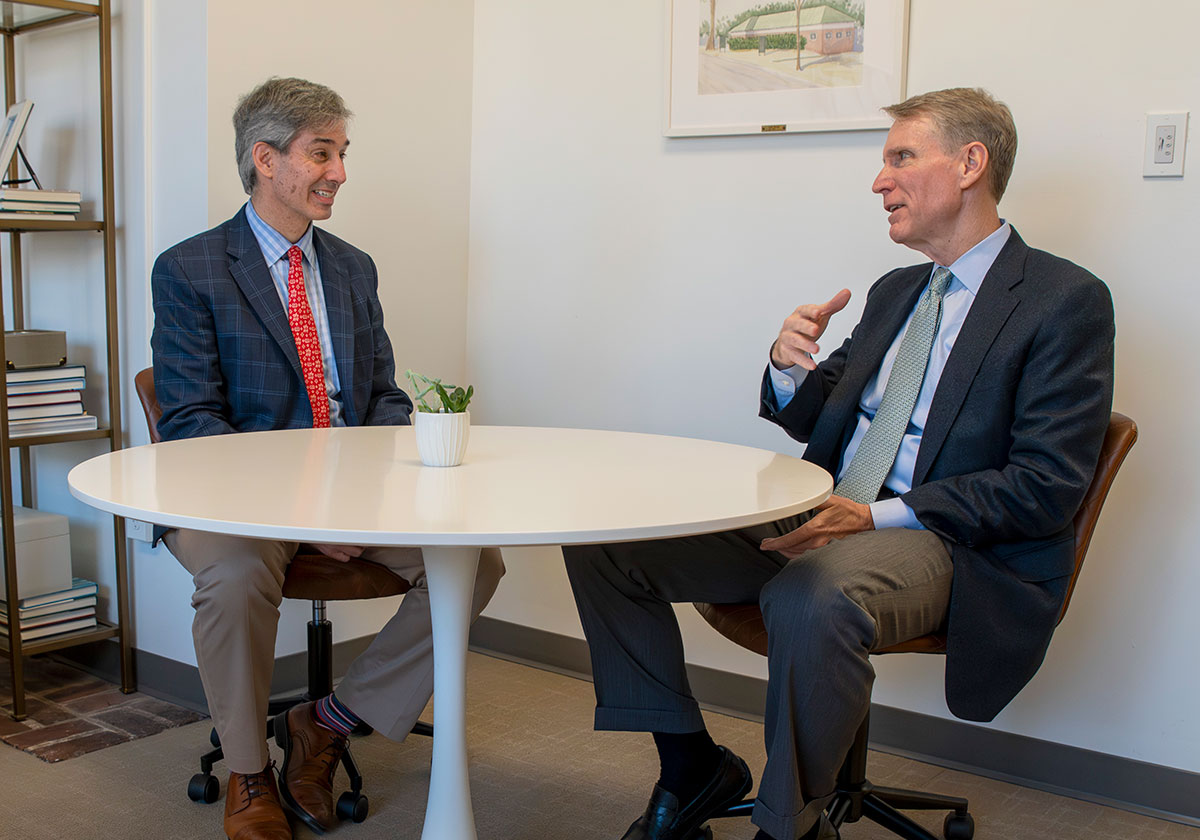
for my graduate school thesis. And then Ray Batts, who ran the honors program. He was a professor of European history. I still remember the first lecture I ever had with him. He walked in and he was electrifying. Those four people really shaped who I am. I wouldn’t be here today if it weren’t for them.
BW: Did you know when you went into college that you wanted to study economics?
TA: I did, but I didn’t want to be overly quantitative. I took differential equations twice. I had envisioned getting a Ph.D., but at a certain point it became so mathematical that it wasn’t as interesting to me. So, I took all my electives in liberal arts. I took a lot of English and a lot of history. I think that’s part of developing a mindset and a skill set that gets you through life. That’s where Ray Batts, who ran the honors program and was a history professor, was so great. In fact, I still have a reading list he typed out for me and gave me when I graduated. He said, “These are the 40 books that should be on your bookshelf, and you should turn to them for the rest of your life.”
BW: I know at the opening faculty meeting you spoke about books, and I know you like to read. What’s one that you’ve read recently that’s had an impact on how you view things and see things?
TA: “The Coming Wave” by Mustafa Suleyman, which is a look at technological change and what it means. Mustafa used to run Google DeepMind in London. It’s a bit of a warning about the power of the technology, the commingling of quantum AI and robotics, and that we need guardrails. I’ve also read “Going Infinite,” the new Michael Lewis book about Sam Bankman-Fried, which is interesting because he was our keynote speaker at my annual meetings last year and I actually got to have lunch with him. Now it’s interesting to see how this whole thing unwound. In fiction, I’ve found two great authors. I really like Claire Keegan, who’s an Irish writer, a young woman who’s written a number of novellas. She’s really fabulous, and the words sing like music off the page. And then Ali Smith is a Scottish writer who’s also quite good. I try to intersperse nonfiction with fiction depending on my mood.
Joining the Board of Governors
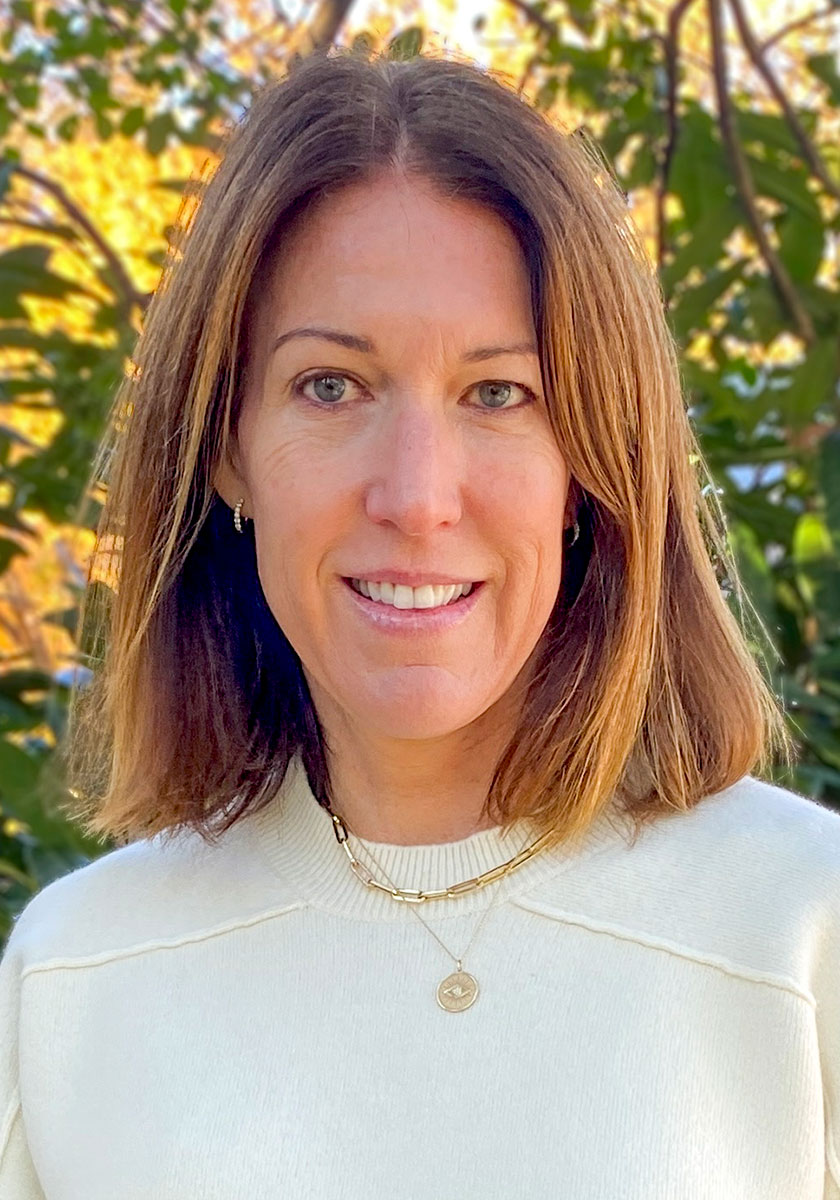
AMY WAGNER HANLEY ’87
“The collective Saints community has been able to maintain an indescribable culture from my high school days in the 1980s through the present day with our daughters and for decades to come.”
After graduating from St. Agnes School in 1987, Amy Hanley received a bachelor’s in political science from Duke University and an MBA from Duke’s Fuqua School of Business. She worked for the National Security Council, in corporate finance at Marriott, and in equity research for an investment back in New York City, before stopping to raise her three daughters, Bridget ’20, Ellie ’22, and Claire ’25, with husband John.
For the past 15 years, she has been a constant volunteer at the school, serving as treasurer for the Association of Parents & Teachers, chairing the Lower School Spring Festival for two years, working on the APT gala committee for several years, helping with Middle School pizza sales, and working weekly for Steve & Aggies café. “I love opportunities to interact with the students when I volunteer,” Amy says. “I especially like working at Steve & Aggie’s café, where I get to engage with the Middle and Upper school students looking for a quick snack–it’s such a fun and happy environment!” She is passionate about giving back and hopes to help enhance volunteer opportunities for SSSAS students in the local community, so they can help tackle the many social and economic challenges in our own backyard.
She and husband John, chose SSSAS for their daughters because Amy wanted them to have the same educational experience she did, believing in the school’s continued rigorous academic curriculum, robust athletics, and core values centered around our Episcopal identity; incredible teachers; and acute sense of community. As a member of the board, she would like to focus on attracting, retaining, and supporting the teachers. “I have such a sense of pride in the school,” Amy says. “The best part of the school is that the faculty and staff continually teach goodness and focus on acceptance, inclusion, and respect. Additionally, Amy recognizes the current challenge of balancing a traditional academic curriculum with modern day advances in technology and ever-changing social issues. She is committed to the school’s promise to prepare our graduates to navigate a complex and changing world.
In her spare time, Amy runs and has participated in six marathons, plays golf, practices yoga, and has just started playing mahjong with a large group of Saints parents of alumni.
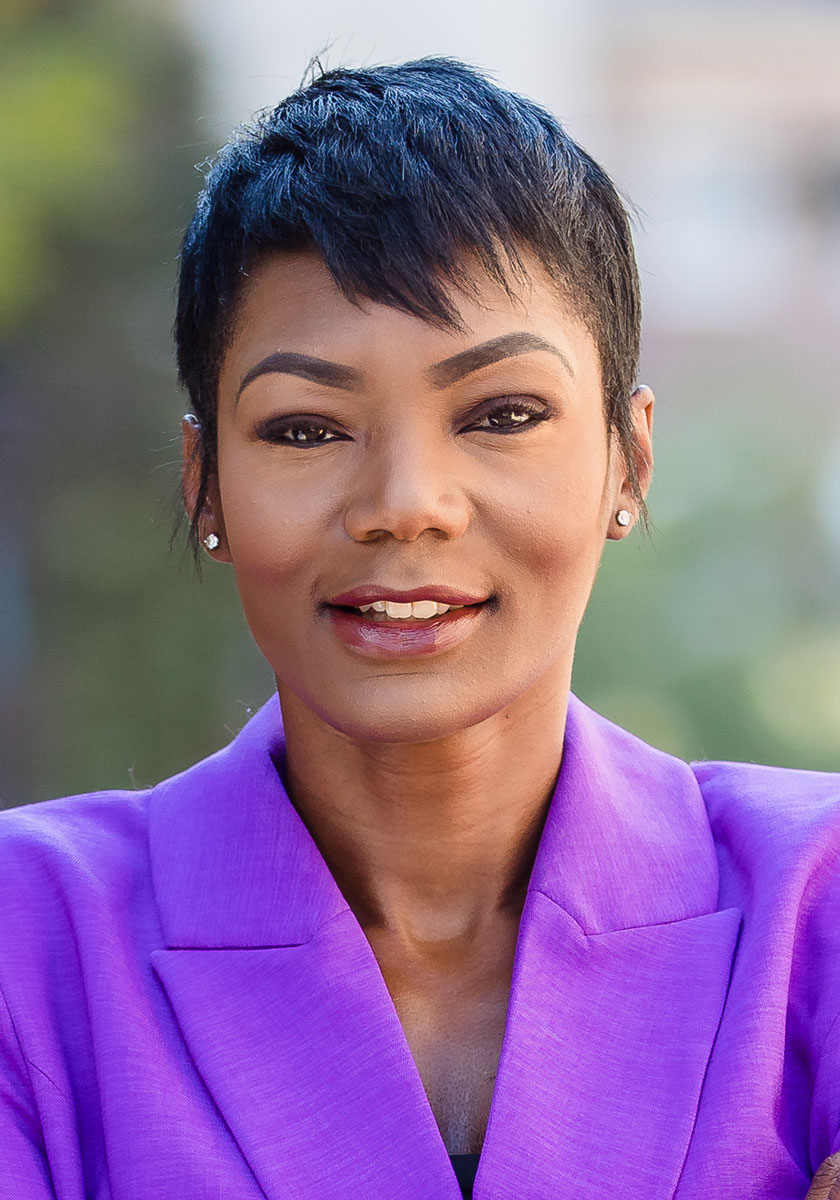
NIKITA MONTGOMERY
“Being a Saint means ensuring that our children’s spiritual, emotional, and academic intelligence thrives in tandem. It means being part of a community where you are welcomed and celebrated. It means bravely challenging old views and introducing new ideas.”
Nikita Montgomery vividly recalls her first visit to the school, because everyone—the children, faculty, and families—seemed genuinely happy. She believes the school’s greatest strengths include the community, the timely and transparent communications from the administration, and the academics. As a member of the Saints community, Nikita is always ready and willing to serve, as a parent and now as a member of the Board of Governors. “From being a parent volunteer to serving on several committees within the APT, I’ve had the opportunity to learn about various facets of our school,” Nikita says. “As a vested member of the Alexandria small business community I’ve had the opportunity to learn more about the city and community that surrounds our school and how we impact one another. Serving on other boards has taught me a lot about governance and organizational leadership.” Nikita is excited about expanding the school’s community engagement. “Our community has tangible and intangible resources that can strike mutually beneficial partnerships and I’m excited about what those can produce.”
She feels passionate about helping to increase and maintain the diversity of the faculty and staff. Nikita is also a member of the boards of the Chamber ALX and Faith City Central.
Nikita is an astute and innovative entrepreneur. Her portfolio includes consulting, real estate, e-commerce, and a salon. Not only is she a commercial realtor with Coldwell Banker in Old Town, Alexandria, Nikita is the co-founder and managing partner of the Hazel O Salon. Nikita and her cousin, Marcia Rhodes Tyler, opened the salon in honor of their grandmother, Hazel Odessa Rhodes, who was a cosmetologist for more than 50 years. At Coldwell Banker, Nikita is focused on assisting businesses in acquiring brick and mortar locations for lease or purchase. She previously worked in public relations handling large events with 300-30,000 attendees. Nikita received a bachelor’s degree in Human Services from The George Washington University and a Certificate in Women’s Entrepreneurship from Cornell University. She loves to read, try out new restaurants in the DMV, travel, and cheer on her children, Bailee ’27, Brody ’30, and brave ’33, at their sporting events and other school endeavors.
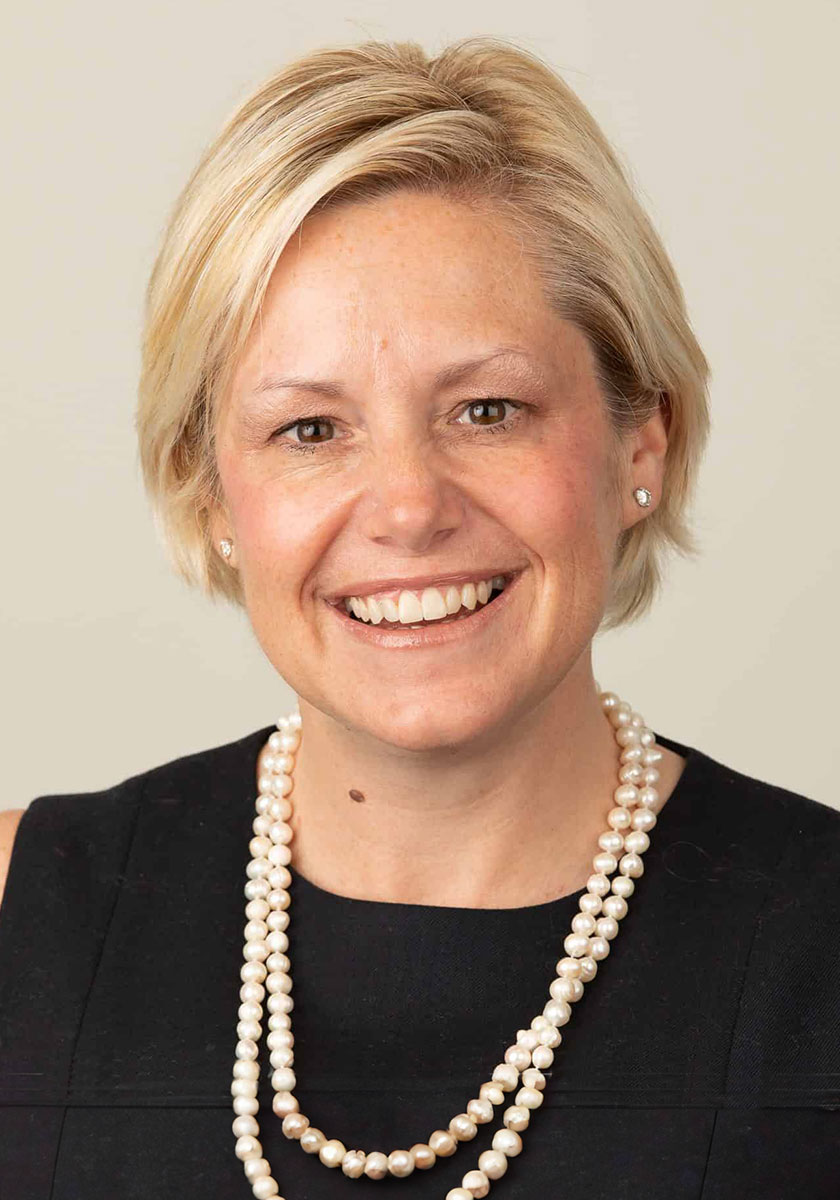
ERIN STREETER
“I am very excited about the construction of the Upper School. It gives our school so much more to offer in a competitive environment, and I have no doubt it will also help us achieve our academic goals.”
When Erin and Chris Streeter were looking for a school for their children, Lizzie, ’23, Lillian ’26, and Grant ’28, they wanted a nurturing environment with rigorous academics and an Episcopal affiliation. “We had no idea we would also come to appreciate the athletic environment, or that we would make the deep friendships our family has made,” Erin says. Erin believes the school’s greatest strength is the Saints community. She joined the Board because she cares deeply about the school and wanted an opportunity to give back.
As the executive vice president of the National Association of Manufacturer (NAM), Erin works with the president and CEO on the association’s strategic direction and lead’s the association’s policy, advocacy, and government relations efforts on behalf of U.S. manufacturers. She also oversees their branding, media, and marketing teams as NAM’s chief communications and public affairs officer. NAM credits Erin with transforming their public relations and marketing departments, expanding its size and reach with an award-winning team. She was named one of PR News’ Top Women in PR in 2015 and 2018. In addition to national awards for design, speechwriting, and digital strategy, Erin’s team received a 2020 Association TRENDS God Award for NAM’s annual report and a 2021 PRO News Award for NAM’s pandemic response-focused digital campaign.
Prior to joining NAM, Erin served as the director of media relations for one of the largest community-based organizations in the country, the YMCA of the USA. She started her career in public policy as the deputy press secretary to Sen. Arien Specter. She has also worked as a television reporter, writer, producer, and anchor news teams in Missouri, Kansas, and Washington, D.C.
Erin holds a degree in journalism from the University of Kansas and volunteers on the Board of Trustees for Page Society, as an executive committee member of the Public Affairs Council, and a board member of the Institute for Public Relations. When she’s not working or volunteering, Erin can be found at a lacrosse game or spending time with her family.
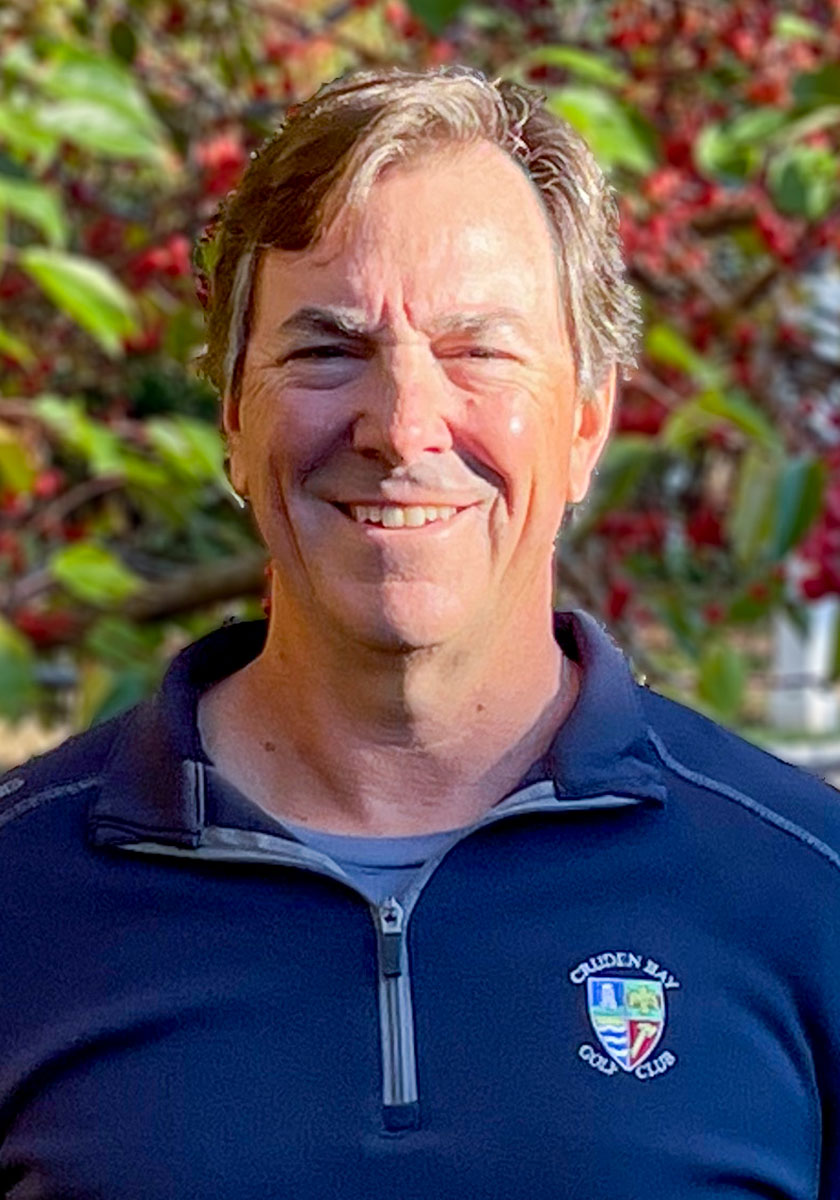
ROBERT M. WADSWORTH ’78
“For me, being a Saint means giving back and helping others have the same or better advantages than you had in your life’s journey.”
Rob Wadsworth is committed to education and gives generously of his time. In addition to previously serving several terms on the SSSAS Foundation Board including chairing the board during his final term and also serving on the SSSAS Board of Governors, Rob served as a trustee of the Dana Hall School in Wellesley, Mass., for 10 years, the St. Sebastian’s School in Needham, Mass., for 10 years, and The University of Virginia School of Engineering and Applied Science for 12 years. He is currently a trustee of Tenacity, Boston, a program focused on the development of underprivileged, inner-city youth attending the Boston Public School.
As a Saint, Rob is very proud of the school that SSSAS has become over time. “Both St. Stephen’s and St. Agnes had great legacies in their own right, however, the combined institution has only improved on the great histories of excellence that established both schools as the premiere day schools in Alexandria,” Rob says. “Without having a personal parent experience at SSSAS it is harder for me to comment on the actual classroom and extracurricular experiences of students today. But knowing the achievements and success rates of the school’s most recent graduates gives me a strong sense the school is providing an invaluable and enviable experience to its students.”
Rob is delighted to return to the Board for a second tour of duty. “SSSAS will always be the school that provided the foundational experiences for everything I, and my brothers Steve ’80 and Jay ’82, have accomplished since graduating” Rob says. “As I consider where my time can have the greatest impact, there is no other organization that I feel as committed to helping it be the best it can be–because in effect, that is what the school did for me.”
Rob is presently the managing partner of W3 Capital, LLS, a family office private equity firm. After graduating from St. Stephen’s, Rob received a bachelor’s in systems engineering and computer science from the University of Virginia and an MBA from Harvard. Following business school, he joined the firm that would become HarbourVest Partners, LLC, a global private equity investor focused on delivering diversified venture capital and private equity solutions to institutional clients. As a cofounder of HarbourVest, he worked to grow the firm from $200 M in assets under management (AUM) in 1986 to over $110 Billion today. During his 33 years at the firm, he worked with over 300 private and public portfolio companies serving on the board of directors of over 50 of those companies. He spent the last seven years before retiring in 2019, as the senior executive on their executive management team overseeing all operations and the firm-wide investment committee.
Returning to the Board, Rob is most excited by the school’s commitment to fiscal strength and independence while making no sacrifices to teaching excellence. “Having world class facilities is critical to attracting both the best teachers, administrators, and families to the crucible that is the school community,” Rob says. “But in order to sustain the school’s hard-fought position as a premiere day school in the region, the leadership has to be committed to building its endowment as well as its physical plant. As no private school can survive on tuition revenue alone, SSSAS needs vigilance in its pursuit of annual and capital campaign contributions to make the desired future a reality. As these objectives of the Strategic Plan wholly align with my values, I am proud to be part of the BOG team.” Rob thinks the most significant challenge remains keeping tuition affordable and financial aid available in order to enable a wide cross section of qualified students and families to have access to the SSSAS experience.
Rob has been an active pilot for 46 years and still flies routinely for business and personal events. He and his family—wife Terry Taylor Wadsworth and children Katie (36), Andy (32), Meredith (30), and Michael (28)—enjoy traveling to new places and having new experiences. Rob also enjoys tennis, golf, skiing, pickleball, fishing, cycling, boating, and sailing—but most of all his favorite activity is doing anything with his four grandchildren.
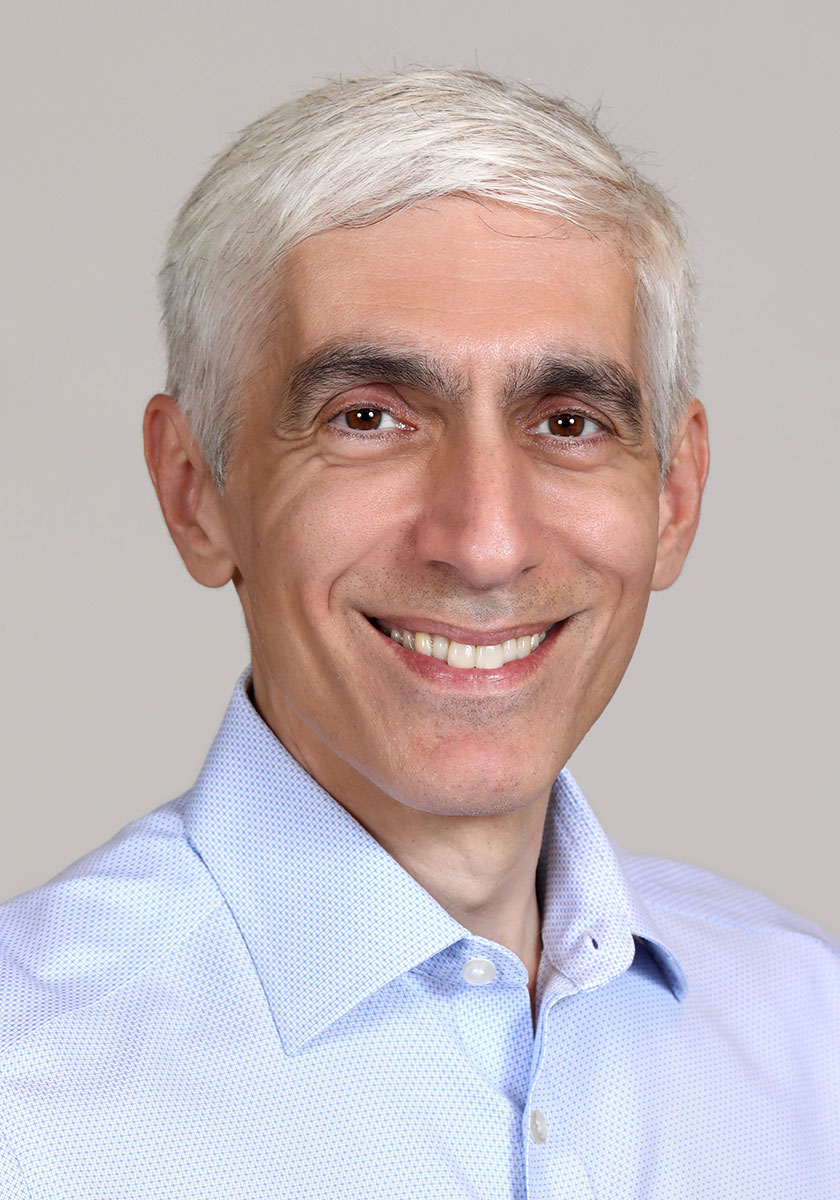
SYRUS ZIAI ’84
“A Saint is a student who strives to better themselves through scholarship and hard work at St. Stephen’s and St. Agnes and beyond, and who brings compassion and fairness to the world.”
After graduating from St. Stephen’s School in 1984, Syrus Ziai received a bachelor’s of science in electrical engineering from Rice University in Houston and started work at Hewlett Packard (HP) as a VLSI (Very Large Scale Integration) Design Manager in Fort Collins, Colorado in 1988. He moved to HP’s Silicon Valley offices in 1996, and has been living in California ever since. He completed a master’s in electrical engineering at Stanford University through a combination of remote and on-site classes in Palo Alto, “before remote learning was a big thing!”
Syrus has served as vice president of engineering at Ikanos, Qualcomm, PsiQuantum, and Nuvia, and spent about six years as a venture investor in the early 2000s. When he joined PsiQuantum in 2016, he was the first employee and senior vice president of engineering at the quantum computing company. In order to learn the basics of quantum information, he returned to school studying one-on-one for a few hours a week with a professor at Carnegie Mellon for six months. PsiQuantum continues as the highest funded quantum computing startup, having raised over $600M of funding. Although Syrus is mostly a chip designer, he has worked with materials scientists, chemists, and physicists, as well as leading software and signal processing teams. Today he is the co-founder and vice president of engineering at Eliyan, a fabless semiconductor company that he started with two partners in 2022. Syrus is married to optometrist Fariba Lessani with whom he has a son, Maziar, a junior at the Harker School in San Jose. In his downtime, Syrus enjoys being with this family, skiing, and playing the piano.
With his experience in senior management and advisory/investor roles, Syrus looks forward to contributing to the SSSAS Board where he hopes to bring a long-term view to the school. His priorities are long-term financial stability and the ability to attract and retain top teachers to serve a broad student base. “I loved my time at St. Stephen’s and St. Agnes School,” Syrus says. “Having left Iran mid-year of my junior year in high school, I joined St. Stephen’s and was welcomed by the entire school community.”
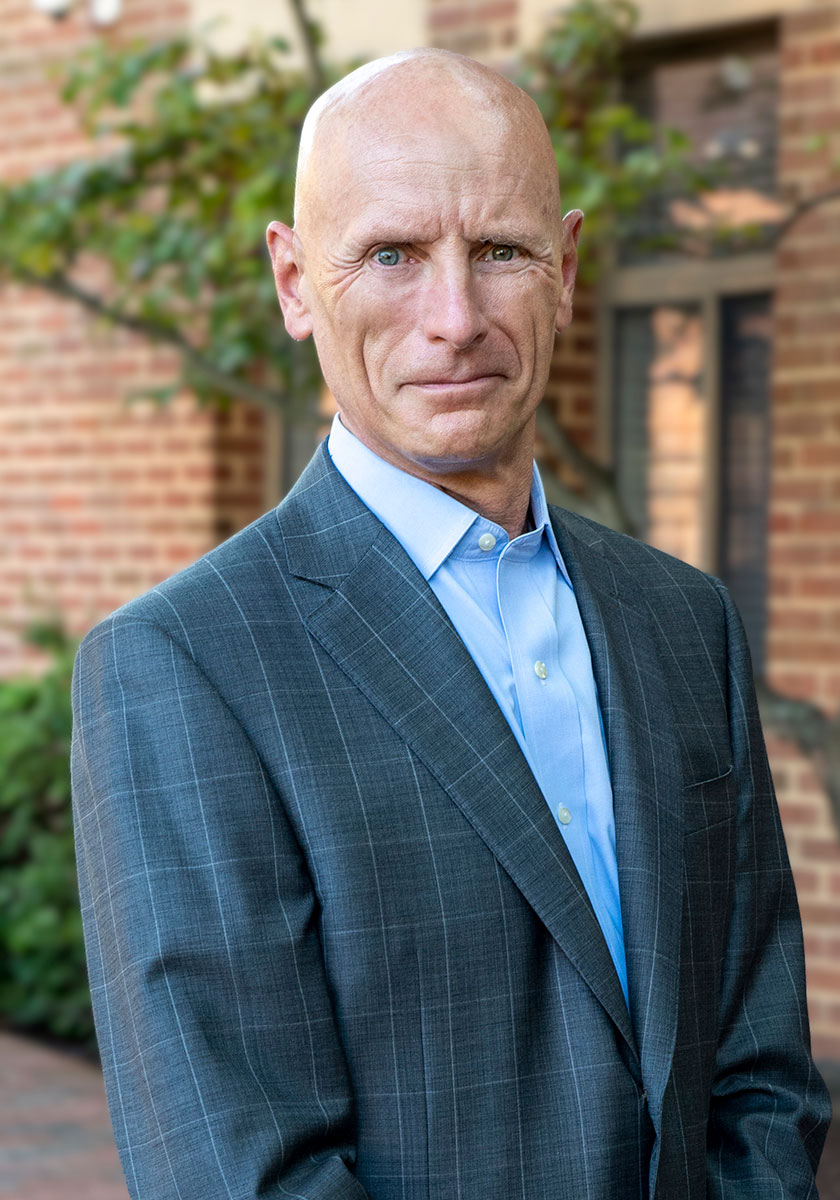
YEARS OF DEDICATION:
SAYING FAREWELL TO CLAY PERFALL
St. Stephen’s and St. Agnes is extremely grateful to Clay Perfall for his extraordinary service to the Board of Governors and the Foundation Board.
Clay brought an extensive executive leadership background and significant financial expertise to the St. Stephen’s and St. Agnes Board, serving from 2005 to 2023. He served as Board chair twice, from 2011-2016 and from 2019-2023. During his service as chair, the Board oversaw Joan Holden’s retirement and the hiring and transition of Kirsten Adams to head of school. Clay was a visionary as the Board developed a new strategic plan and a campus master plan, and he provided a steady hand during the challenges of Covid.
Clay and his wife, Anne, were also active parents in the school and are proud of their Saints graduates, son Cal ’10, and daughters Evelyn ’19, and Adrienne ’22.
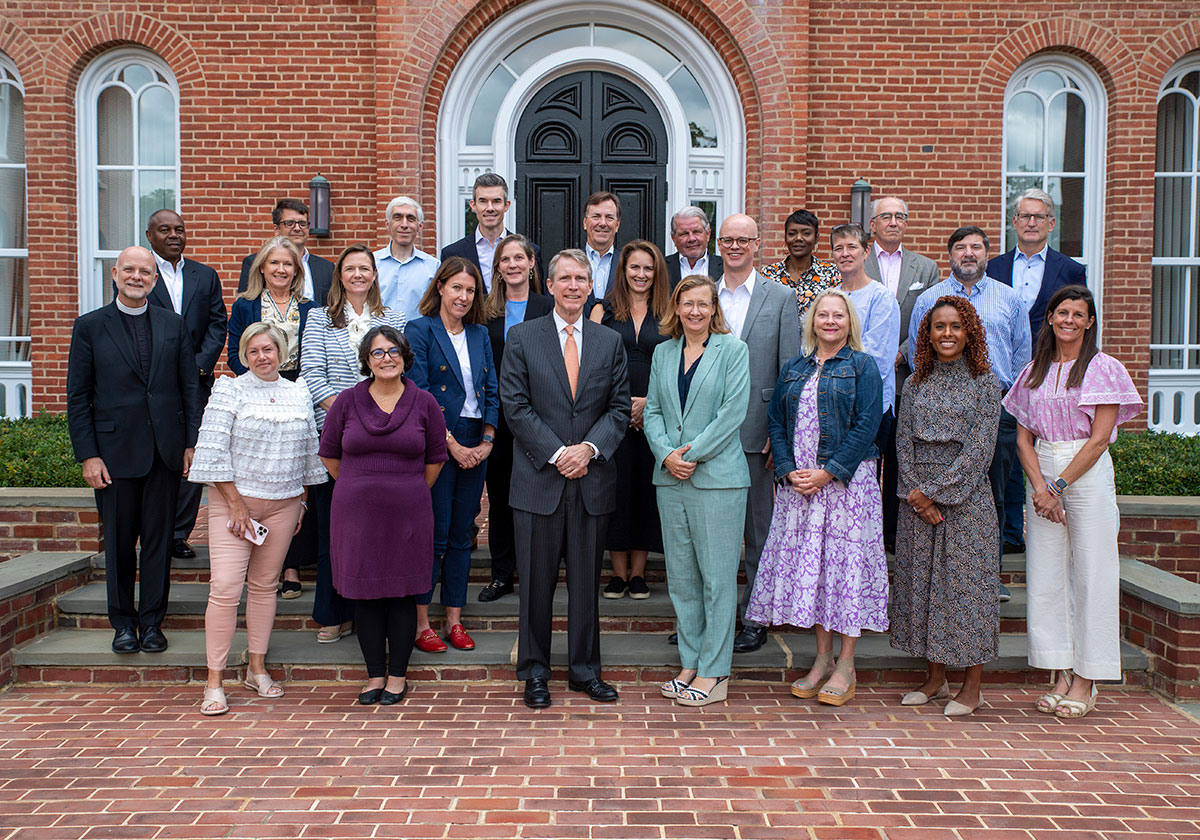
On The Board
Timothy Adams, Chair
Barrye Price, Vice-Chair
Adrian Azer ’96
Jason Booma
Eugene Bounds
Reginald J. Brown
Peter Chadwick
Sabrina Crawford
David Felsenthal
Amy Hanley ’87
Peter Keefe
Taylor Kiland ’85
Sarah Knutson
Charles Molster III
Nikita Montgomery
Katherine Murphy
Shiloh Roehl
Elizabeth Siegel
Erin Streeter
Jim Taylor ’84
Rob Wadsworth ’78
Rev. Oran Warder
Katie Woodruff
Syrus Ziai ‘84
Ex-Officio Members:
Henry Broaddus, President, CSDV
Kirsten Adams, Head of School

